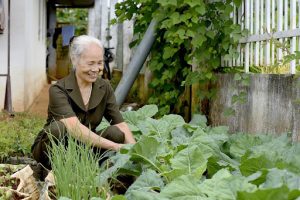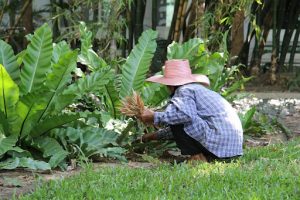
Image Credit: duchuy01081986 / Pixabay
Gardening is a popular pastime for people of all ages. Tending to and nurturing greenery is therapeutic for anyone as you can watch the fruits of your labour grow before your eyes. But there are plenty of other benefits that come with gardening as we get older.
Why Seniors Should Garden
This is a great activity for seniors to stay active. The old saying goes “an object in motion stays in motion”, and that holds true with us as we age. Gardening can help older generations keep moving and maintain productivity, as opposed to staying idle and experiencing a rapid physical (and even mental) decline.
Benefits of Horticulture for Seniors
Tending to the garden can be a low-impact exercise. It allows seniors to not only get their muscles moving but to enjoy some vitamin D from the sun’s rays, as well as some fresh air. This activity requires focus and can help keep the mind sharp as well as improve grip strength and dexterity. Gardening with family members can also help to strengthen relationships, in an age where so many people rely on technology to communicate. Seniors will benefit from taking time to teach their grandchildren the beauty of growing plants, nurturing not only their greenery but their loving relationships as well!

Image Credit: ELIZABETED / Pixabay
Gardening Reduces Stress Levels
The act of gardening can help to lower blood pressure and cortisol, the hormone that causes stress. While cortisol decreases, the feel-good hormone serotonin increases. Coupled with these facts and a little bit of the warm sun, taking time in the garden is sure to boost positive feelings in seniors.
Benefits of Friendly Bacteria
An uncommonly known fact is that there are bacteria in soil that can be beneficial to the body. The bacteria are called mycobacterium vaccae and have been shown to help reduce problems such as psoriasis, and asthma. These are all ailments that frequently plague seniors, so digging into the dirt is a great way for them to help boost their immune system. In addition to helping alleviate these conditions, this bacterium can also assist in the creation of serotonin which may increase happiness.
Gardening for Seniors with Alzheimer’s & Dementia
If a senior does not have Alzheimer’s or Dementia, this hobby is the perfect way to help lower the risk of developing these diseases. If they do have it, it can be a therapeutic activity that helps them to feel stimulated and engaged with their surroundings. Additionally, if they were a gardener beforehand, it can give them a comforting feeling as it is something that made them happy in the past. Gardening is undertaken in typically peaceful environments and is beneficial when included in senior living communities. Shaping gardens into the number 8 may also have increased benefits, as dead ends can cause more confusion in those with Alzheimer’s or Dementia.
Obstacles to Overcome
While this is an engaging activity for everyone, seniors may need some adjustments made to allow them to enjoy this hobby to the fullest. Raised beds & planters are perfect for not only being cared for when the senior is using a wheelchair or walker, but it is also a great way to control pests and weeds since it is off the ground.
If the bed is on the ground, there are stools and carts available for them to sit comfortably while tending to the garden to avoid putting pressure on their knees. Seniors should also be gardening when it is not the hottest part of the day to prevent overheating and burning and should be wearing proper gear, such as sunglasses, sunblock, a sunhat, and a long-sleeved button-up. This helps to prevent getting burnt, as many seniors could have photosensitivity from different medications.
Gardening Tools for Seniors
There are different tools on the market available that have adjustments made to make gardening an easier and more pleasurable experience. There is equipment that has soft grips with easy to hold on handles, as well as different lengths that fit best for the person. If a senior still wants to kneel to get their work done, there are kneeling pads that can be bought to soften the friction between their knees and the ground. Ergonomic pruners are also designed to reduce the work and effort of the user by approximately thirty percent, allowing seniors to use these confidently and comfortably.
Best Practices for a Lifetime of Growing
Gardening helps give seniors independence outside of the home and a way to relieve stress whilst doing something that they love. For them to continue to enjoy this hobby, seniors should ensure they are wearing proper protective wear during non-peak hours and using tools that work with them rather than against them. A security system of some sort should be set in place in case of an accident, especially if they live alone. This could be a life alert, carrying a cell phone, or an alert base outside that they could use if needed.
With all these tips in mind, another best practise for gardening is to do so with family. Family can help nurture the garden and it will become collaborative labour of love. It also is a fantastic bonding experience that allows for time spent together, as well as receiving some help in pulling some nasty weeds that seem to keep popping up in all the wrong places.
Conclusion
Spending time outside to soak in the sun rays and play in the dirt has a plethora of mental and physical health benefits for anyone, especially seniors. It can help to keep the mind sharp and engaged, as well as soothe those who may often feel stressed or agitated. With the proper adjusted tools to maintain safety, gardening is a stress-free, calming activity that seniors can enjoy, and will enjoy even more when doing so with their loved ones.


